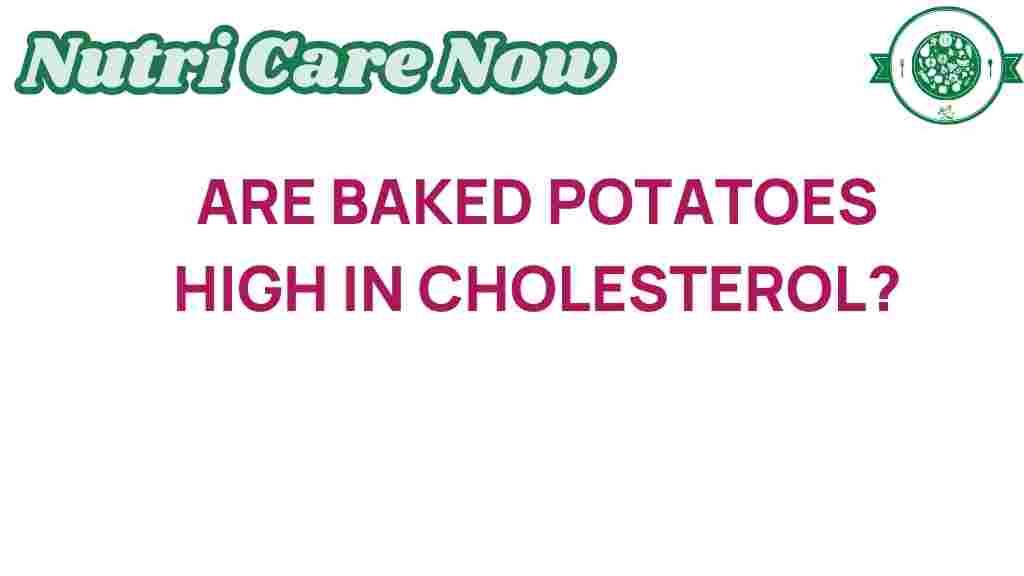Are Baked Potatoes a Cholesterol Risk?
Baked potatoes are a staple in many diets around the world, often considered a healthy option due to their nutritional profile. However, with a growing focus on heart health and dietary fat, many people wonder if baked potatoes pose a cholesterol risk. In this article, we will unpack the truth about baked potatoes, their impact on cholesterol, and how they fit into a balanced diet.
Understanding Cholesterol and Heart Health
Cholesterol is a waxy substance found in your blood, essential for building healthy cells. However, high levels of cholesterol can increase your risk of heart disease. There are two main types of cholesterol:
- Low-Density Lipoprotein (LDL): Often referred to as “bad” cholesterol, high levels of LDL can lead to plaque buildup in your arteries.
- High-Density Lipoprotein (HDL): Known as “good” cholesterol, HDL helps remove other forms of cholesterol from your bloodstream.
Maintaining a healthy balance between LDL and HDL is crucial for heart health. Dietary choices, including the consumption of baked potatoes, can influence these levels.
The Nutritional Profile of Baked Potatoes
Baked potatoes are not only delicious but also packed with nutrients. Here’s a closer look at their nutritional components:
- Carbohydrates: Baked potatoes are a rich source of carbohydrates, essential for energy.
- Dietary Fiber: They provide a good amount of dietary fiber, which aids digestion and can help lower cholesterol levels.
- Vitamins and Minerals: Baked potatoes are high in vitamin C, potassium, and vitamin B6, contributing to overall health.
- Low in Fat: Naturally, baked potatoes are low in fat and contain no cholesterol.
Given this profile, baked potatoes can be a healthy addition to your diet, especially when prepared properly.
Cooking Methods and Their Impact on Health
The way you cook your baked potatoes can significantly impact their health benefits. Here are some popular cooking methods and their effects:
- Traditional Baking: Baking potatoes in their skin preserves their nutrients and keeps them low in fat. This method is one of the healthiest options.
- Microwaving: Quick and convenient, microwaving can also retain most of the nutrients without adding fat.
- Boiling: Boiling can leach some nutrients into the water, but it is still a healthy option if you avoid adding butter or cream.
- Frying: Frying potatoes, such as making French fries, adds unhealthy fats and can significantly increase cholesterol levels.
Tip: For optimal heart health, stick to baking or microwaving your potatoes and avoid frying whenever possible.
How Baked Potatoes Fit into a Heart-Healthy Diet
Incorporating baked potatoes into a heart-healthy diet is easy if you consider the following:
- Portion Control: Moderation is key. Enjoy baked potatoes as part of a balanced meal.
- Healthy Toppings: Instead of butter or sour cream, opt for healthier toppings like Greek yogurt, salsa, or steamed vegetables.
- Pairing: Pair baked potatoes with lean proteins (like grilled chicken or fish) and plenty of vegetables for a nutritious meal.
By being mindful of your toppings and pairings, you can enjoy baked potatoes without increasing your cholesterol risk.
Common Misconceptions About Baked Potatoes and Cholesterol
There are several misconceptions about baked potatoes that can lead to confusion regarding their health implications:
- Myth 1: Baked potatoes are high in cholesterol.
Truth: Baked potatoes themselves contain no cholesterol. - Myth 2: Eating potatoes will raise my cholesterol levels.
Truth: Potatoes are low in fat and can actually help improve cholesterol levels when consumed with healthy toppings. - Myth 3: All cooking methods affect potatoes the same way.
Truth: Different cooking methods have varying impacts on the health benefits of potatoes.
By understanding the facts, you can make informed choices about including baked potatoes in your diet.
Step-by-Step Guide to Preparing a Healthy Baked Potato
Here’s a simple step-by-step guide to preparing a healthy baked potato:
- Choose Your Potato: Select medium-sized russet or Yukon gold potatoes for the best flavor and texture.
- Wash Thoroughly: Rinse the potatoes under running water to remove any dirt or impurities.
- Poke Holes: Use a fork to poke several holes in each potato to allow steam to escape during cooking.
- Season (Optional): Lightly coat with olive oil and sprinkle with salt for added flavor (optional).
- Bake: Place the potatoes directly on the oven rack at 425°F (220°C) for about 45-60 minutes or until tender.
- Check for Doneness: Insert a fork or knife to ensure the potatoes are soft inside.
- Add Healthy Toppings: Top with Greek yogurt, chives, or your favorite vegetables.
Troubleshooting Tips for Perfect Baked Potatoes
If you’re having trouble achieving the perfect baked potato, here are some troubleshooting tips:
- Potatoes are Hard: Ensure you’re baking them long enough; larger potatoes may require extra time.
- Skin is Tough: Try wrapping the potatoes in foil for a softer skin, but remember that this may alter the cooking time.
- Uneven Cooking: Rotate the potatoes halfway through the cooking time for even baking.
Conclusion
In conclusion, baked potatoes can be a healthy addition to your diet without posing a cholesterol risk when prepared and consumed mindfully. With their impressive nutritional profile, low fat content, and versatility in cooking methods, baked potatoes can support heart health rather than hinder it. By choosing healthy toppings and cooking methods, you can enjoy this delicious food as part of a balanced diet.
For more information on healthy eating and nutrition, check out this resource that provides further insights into heart-healthy diets.
Remember to consult with a healthcare provider or nutritionist if you have specific dietary concerns, especially regarding cholesterol levels.
This article is in the category Health and created by NutriCareNow Team

1 thought on “Are Baked Potatoes a Cholesterol Risk? Unpacking the Truth”